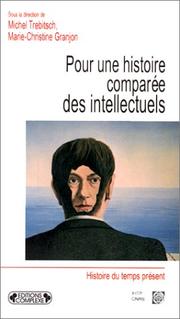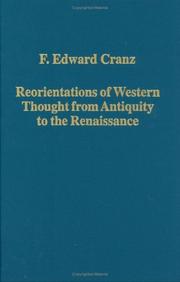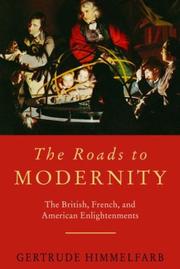| Listing 1 - 10 of 15 | << page >> |
Sort by
|

ISBN: 2870277067 9782870277065 Year: 1998 Publisher: Bruxelles: Complexe,
Abstract | Keywords | Export | Availability | Bookmark
 Loading...
Loading...Choose an application
- Reference Manager
- EndNote
- RefWorks (Direct export to RefWorks)
Bibliotheek François Vercammen
Culture --- Cultuur --- Geschiedenis --- Histoire --- Maatschappij --- Société --- Intellectuals --- Intellectuels --- History --- geschiedenis --- Intellectual life --- Historiography --- Historiography. --- Intellectual life - Historiography --- Intellectual life - Cross-cultural studies --- Intellectual life - History - 20th century --- Methode comparative --- Historiographie --- 20e siecle --- Etudes comparatives

ISBN: 0860789837 9780860789833 Year: 2006 Volume: 840 Publisher: Aldershot: Ashgate,
Abstract | Keywords | Export | Availability | Bookmark
 Loading...
Loading...Choose an application
- Reference Manager
- EndNote
- RefWorks (Direct export to RefWorks)
Philosophy --- Learning and scholarship --- History. --- History --- Europe --- Intellectual life --- To 1500 --- Erudition --- Scholarship --- Civilization --- Education --- Research --- Scholars --- Intellectual life. --- Philosophy - History. --- Learning and scholarship - History - To 1500. --- Europe - Intellectual life - History.
Multi
ISBN: 9783031277337 9783031277320 9783031277344 9783031277351 303127735X Year: 2023 Publisher: Cham Springer Nature Switzerland :Imprint: Palgrave Macmillan
Abstract | Keywords | Export | Availability | Bookmark
 Loading...
Loading...Choose an application
- Reference Manager
- EndNote
- RefWorks (Direct export to RefWorks)
This book approaches Hobbes's philosophy from a completely new perspective: his creativity. Creativity is the production of something which experts consider to be original, valuable and of high quality. James Hamilton explores Hobbes's creativity by focusing on his development, personality, and motivation in the context of his culture and environment, and on the ways in which he thought creatively, as inferred from his writings. Identification of the ideas which Hobbes drew upon is an important part of the study for two reasons. First, they are necessary to determine which of Hobbes's ideas and theories are original and which are not. Second, analysis of his creativity requires an understanding of the ideas from which he drew. Hamilton concludes that Hobbes became a great philosopher because of his creative virtuosity. James J. Hamilton served in the U.S. Foreign Service from 1979 to 2006. He received his Ph.D. in Political Science from Columbia University in 1978, and taught briefly at Purdue University, West Lafayette, IN.
Philosophy --- Theory of knowledge --- Politics --- intellectuele ontwikkeling --- filosofie --- politiek --- Philosophy. --- Political science. --- Intellectual life—History. --- Political Theory. --- Intellectual History. --- Aesthetics --- Hobbes, Thomas --- Hobbes, Thomas, --- Philosophy, British --- Hobbes, Thomas, 1588-1679
Multi
ISBN: 9783031148163 9783031148156 9783031148170 9783031148187 Year: 2023 Publisher: Cham Springer International Publishing :Imprint: Palgrave Macmillan
Abstract | Keywords | Export | Availability | Bookmark
 Loading...
Loading...Choose an application
- Reference Manager
- EndNote
- RefWorks (Direct export to RefWorks)
This book is the first critical interdisciplinary examination in English of Italian women’s contributions to intellectual, artistic, and cultural production in modern Italy. Examining commonalities and diversities from the country’s Unification to today, the volume provides insight into the challenges that Italian women engaged in cultural production have faced, and the strategies they have deployed in order to achieve their objectives. The essays address a range of issues, from women’s self-identification and public ownership of their professional roles as laborers in the intellectual and cultural realm, to questions about motherhood and financial remuneration, to the role of creative foreign women in Italy. Through critical analysis and direct testimony from new and typically marginalized voices, including an Arab-Italian writer, an Italian-Dominican filmmaker, and a transgender activist, new forms of ongoing struggle emerge that redefine the culturally diverse landscape of female intellectual and creative production in Italy today. The volume rethinks a solely national “Made in Italy” reading of the subject of female intellectual labor, demonstrating instead the wide network of influences and relationships that have existed for Italian women in their professional aspirations. Sharon Hecker is an Independent Art Historian and Curator specializing in modern and contemporary Italian art. Her publications include A Moment’s Monument: Medardo Rosso and the International Origins of Modern Sculpture (2017), Postwar Italian Art History: Untying ‘The Knot’ (2018), and Curating Fascism: Exhibitions and Memory from the Fall of Mussolini to Today (2022). She is Editor of the Visual Cultures and Italian Contexts Series for Bloomsbury Visual Arts. Catherine Ramsey-Portolano is Associate Professor and Director of the Italian Studies Program at The American University of Rome, Italy. Her publications include Nineteenth-Century Italian Women Writers and the Woman Question (2020), Performing Bodies: Female Illness in Italian Literature and Cinema (2017), The Future of Italian Teaching: Media, New Technologies and Multi-Disciplinary Perspectives (2015), and The Italianist special issue Rethinking Neera (2010), co-edited with Katharine Mitchell.
Theory of knowledge --- Comparative literature --- History --- History of Italy --- History of Eastern Europe --- intellectuele ontwikkeling --- geschiedenis --- literatuur --- Comparative literature. --- Art—History. --- Italy—History. --- Intellectual life—History. --- Comparative Literature. --- Art History. --- History of Italy. --- Intellectual History.

ISBN: 1400042364 9781400042364 Year: 2004 Publisher: New York: Knopf,
Abstract | Keywords | Export | Availability | Bookmark
 Loading...
Loading...Choose an application
- Reference Manager
- EndNote
- RefWorks (Direct export to RefWorks)
Enlightenment --- Intellectual life --- Philosophy, Modern --- History --- Great Britain --- France --- United States --- Enlightenment - Great Britain --- Enlightenment - France --- Enlightenment - United States --- Intellectual life - History --- Philosophy, Modern - 18th century --- Great Britain - Intellectual life - 18th century --- France - Intellectual life - 18th century --- United States - Intellectual life - 18th century
Book
ISBN: 9783030153533 3030153533 9783030153526 3030153525 9783030153540 3030153541 9783030153557 303015355X Year: 2019 Publisher: Cham Springer International Publishing :Imprint: Palgrave Macmillan
Abstract | Keywords | Export | Availability | Bookmark
 Loading...
Loading...Choose an application
- Reference Manager
- EndNote
- RefWorks (Direct export to RefWorks)
‘‘In this compelling interdisciplinary book, Jane Desborough brings lucid academic analysis to explore the practical world of skilled craftsmanship. Focusing on Britain, but with extended European comparisons, she examines over 250 dials to reveal how their multi-functional appearance gradually evolved into a standard format... a brilliantly original and comprehensive approach.’’ Patricia Fara, President of the Antiquarian Horological Society and Emeritus Fellow, Clare College, University of Cambridge, UK ‘’By showing the ways in which the information conveyed by clock and watch dials changed over time, Jane Desborough’s excellent book reveals and explains the changing needs of their owners and therefore the underlying changes in society and culture. The result is eye-opening, enlightening, and continually fascinating.’’ John Henry, Professor Emeritus, University of Edinburgh, UK This book provides a reinterpretation of early modern clock and watch dials on the basis of use. Between 1550 and the emergence of a standard format in 1770, dials represented combinations of calendrical, lunar and astronomical information using multiple concentric rings, subsidiary dials and apertures. Change was gradual, but significant. Over the course of eight chapters and with reference to thirty-five exceptional images, this book unlocks the meaning embedded within these early combinations. The true significance of dial change can only be fully understood by comparing dials with printed paper sources such as almanacs, diagrams and craft pamphlets. Clock and watch makers drew on traditional communication methods, used different formats to generate trust in their work, and tried to help users in different contexts. The calendar, lunar and astronomical functions were useful as a memory prompt for astrology up until the mid-late seventeenth century. .
Science --- Theory of knowledge --- Engineering sciences. Technology --- History of civilization --- History --- History of Europe --- intellectuele ontwikkeling --- nieuwste tijd --- cultuurgeschiedenis --- geschiedenis --- technologie --- Europese geschiedenis --- nieuwe tijd --- anno 1500-1799 --- Europe --- Civilization --- Civilization. --- Europe-History-1492-. --- Intellectual life --- Intellectual life. --- Technology. --- History. --- Intellectual life—History. --- Europe—History—1492-. --- Technology—History. --- Civilization—History. --- Intellectual Studies. --- History of Early Modern Europe. --- History of Technology. --- Cultural History.
Book
ISBN: 9783319974033 3319974033 Year: 2019 Publisher: Cham Springer International Publishing :Imprint: Palgrave Macmillan
Abstract | Keywords | Export | Availability | Bookmark
 Loading...
Loading...Choose an application
- Reference Manager
- EndNote
- RefWorks (Direct export to RefWorks)
This book examines the Kemalist ideology of Turkey from two perspectives. It discusses major problems in the existing interpretations of the topic and how the incorporation of Soviet perspectives enriches the historiography and our understanding of that ideology. To address these questions, the book looks into the origins, evolution, and transformational phases of Kemalism between the 1920s and 1970s. The research also focuses on external interpretations by observing how republican Turkey and particularly its founding ideology were viewed and interpreted by Soviet observers. Paying more attention to the diplomatic, geopolitical, and economic complexities of Turkish-Soviet relations scholars have rarely problematized those perceptions of Turkish ideological transformations. Looking at various phases of Soviet attitudes towards Kemalism and its manifestations through the lenses of Communist leaders, party functionaries, diplomats and scholars, the book will illuminate the underlying dynamics of Soviet interpretations. .
Science --- Cognitive psychology --- Theory of knowledge --- Politics --- History as a science --- History --- History of Eastern Europe --- historiografie --- intellectuele ontwikkeling --- communisme --- geschiedenis --- politiek --- wereldpolitiek --- geheugen (mensen) --- Russia --- Turkey --- Russia—History. --- Europe, Eastern—History. --- Historiography. --- World politics. --- Intellectual life—History. --- Russian, Soviet, and East European History. --- Memory Studies. --- Political History. --- Intellectual Studies.
Book
ISBN: 9783031188251 303118825X 3031188241 Year: 2023 Publisher: Cham Springer International Publishing :Imprint: Palgrave Macmillan
Abstract | Keywords | Export | Availability | Bookmark
 Loading...
Loading...Choose an application
- Reference Manager
- EndNote
- RefWorks (Direct export to RefWorks)
This book attempts to delve into the connection between imagination and politics, and examines the many expectations and fears engendered by the Irish home rule debate. More specifically, it assesses the ways politicians, artists and writers in Ireland, Britain and its empire imagined how self-government would work in Ireland after the restitution of an Irish parliament. What did home rulers want? What were British supporters of Irish self-government willing to offer? What did home rule mean not only to those who advocated it but also to those who opposed it? Pauline Collombier is Associate Professor at the University of Strasbourg, France.
Home rule --- Ireland --- Great Britain --- Politics and government --- Relations --- Home rule (Ireland) --- Irish question --- Great Britain—History. --- Intellectual life—History. --- Civilization—History. --- World politics. --- History of Britain and Ireland. --- Intellectual History. --- Cultural History. --- Political History. --- Colonialism --- Global politics --- International politics --- Political history --- Political science --- World history --- Eastern question --- Geopolitics --- International organization --- International relations --- Home rule. --- Rule, Home --- Autonomy
Multi
ISBN: 9783031239403 9783031239397 9783031239410 9783031239427 Year: 2023 Publisher: Cham Springer Nature Switzerland :Imprint: Palgrave Macmillan
Abstract | Keywords | Export | Availability | Bookmark
 Loading...
Loading...Choose an application
- Reference Manager
- EndNote
- RefWorks (Direct export to RefWorks)
This book challenges existing accounts of the role of religion in early-nineteenth-century British socialism. Against scholarly interpretations which have identified Owenite socialists as anti-religious or as imitating Christianity, this book argues that Owenites offer a re-conception of the nature of ‘religion’ as advanced through knowledge of the natural and social world, as a prospective source of solidarity which could serve as the unifying bond for communities, and as constituted by ethical conduct. It shows how this re-conception was formed through a sincere and considered reflection upon the problem of religious truth and was shaped by the particular religious context of early-nineteenth-century Britain. It then demonstrates the importance of this reimagination of religion to their understanding of socialism. Their religious interests were not an eccentric adornment to their socialism, an outdated residue yet to be shed and encumbering the development of a mature socialism, or merely instrumental to their temporal goals. Instead, Owenite ambitions of religious reform were grounded in the philosophical preoccupations which animated their socialism. Edward Lucas completed his DPhil at the University of Oxford, UK and now works for the UK government.
Theory of knowledge --- Religious studies --- Politics --- World history --- History --- History of the United Kingdom and Ireland --- History of Eastern Europe --- intellectuele ontwikkeling --- religie --- geschiedenis --- politiek --- sociale geschiedenis --- wereldpolitiek --- Europese geschiedenis --- Great Britain—History. --- Religion—History. --- Social history. --- Intellectual life—History. --- World politics. --- History of Britain and Ireland. --- History of Religion. --- Social History. --- History of Ideas. --- Political History.
Multi
ISBN: 9783031168123 9783031168116 9783031168130 Year: 2022 Publisher: Cham Springer International Publishing :Imprint: Palgrave Macmillan
Abstract | Keywords | Export | Availability | Bookmark
 Loading...
Loading...Choose an application
- Reference Manager
- EndNote
- RefWorks (Direct export to RefWorks)
“Crafted with Bishop’s usual assiduity and delightful style, this book provides much needed clarification of Jung’s complex relation to Plato, and Jung’s cryptic accounts of the Third and the Fourth.” —Lucy Huskinson, Professor, Bangor University, UK. “Bishop’s masterful analysis [reveals] a key to understanding the real-world significance and ethical challenge of Jung’s entire clinical and cultural thought." —Roderick Main, Professor, University of Essex, UK. “This is a book brimming with original ideas and new connections […]. I highly recommend this to anyone interested in the living legacy of Platonic thought and its influence on depth psychology.” —Phil Goss, Associate Professor, University of Warwick, UK, and Jungian Analyst. This book examines the Jungian imperative that the Third must become the Fourth through the lens of Carl Jung’s complex reception of Plato. While in psychoanalytic discourse the Third is typically viewed as an agent that brings about healing, the author highlights that, in the case of Jung, an early emphasis on the Third as the “transcendent function” gave way to an increasing insistence on the importance of the Fourth. And yet, he asks, why must “the Third become the Fourth”? Paul Bishop begins with a survey of work on Jung’s relation to Plato, before turning to Jung’s readings of the Timaeus and Black Books, as well as Goethe’s Faust II and Nietzsche’s Zarathustra. He proceeds to unpick Jung’s statements on the Third and the Fourth though a compelling analysis of how Jung draws upon religious and alchemical traditions, Pythagorean numerology, his own dream-like experiences and Plato’s cosmology. This book will appeal to practitioners and to scholars working in the history of ideas, psychoanalysis, philosophy, and psychoanalytic theory. Paul Bishop is William Jacks Chair of Modern Languages at the University of Glasgow, UK. .
Psychology --- Theory of knowledge --- Psychiatry --- Comparative literature --- intellectuele ontwikkeling --- psychiatrie --- psychologie --- geschiedenis --- literatuur --- Psychoanalysis. --- Intellectual life—History. --- Jungian psychology. --- Psychology. --- Social sciences—History. --- Comparative literature. --- History of Ideas. --- Analytical Psychology. --- History of Psychology. --- Comparative Literature. --- Psicologia analítica --- Influència --- Jung, C. G. --- Plató,
| Listing 1 - 10 of 15 | << page >> |
Sort by
|

 Search
Search Feedback
Feedback About UniCat
About UniCat  Help
Help News
News